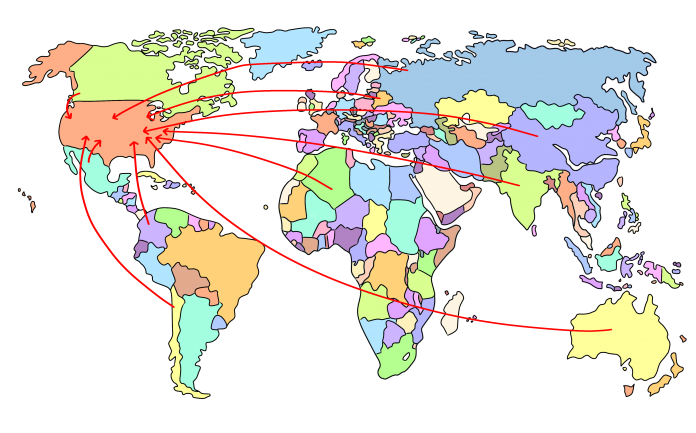As two interns working for the George Washington University Law Immigration Clinic, we work directly with immigrant clients seeking asylum and other immigration statuses. These clients make up some of the most vulnerable groups of immigrants and the trauma they experience is heart-wrenching.
While some college students may feel far removed from the immigration process, many students on the College of William and Mary’s campus are immigrants themselves, are international students or come from immigrant families. Their lives are directly affected by President Donald Trump’s administration and its decisions concerning immigration policy.
Because we predominantly serve the Washington D.C. area, some College students may know of family or friends that could utilize our legal services. Regardless of personal connection, we feel that the opportunity to provide a glimpse into the immigration process and into the lives of our clients is incredibly valuable.
Under the Trump administration, immigration policies seem to change constantly, and they change real people’s lives. Immigration law went from bad policy to becoming part of a malicious atmosphere, with the understanding that it is going to hurt people. As interns, we have met clients who have lived, worked and loved in the United States for years or even decades who are now at the mercy of one administration’s whims. They are mothers, fathers, grandparents and kids with dreams of living a normal life in the United States, but the sacrifices they make are great.
Most of the people we assist are asylees, meaning they were granted protection by the U.S. government due to credible fear of violence or persecution in their home country. They are provided a path to citizenship, albeit an expensive. and invasive path. They live their lives in limbo while they wait on the broken immigration system. Some clients came here as children and were protected by Unaccompanied Alien Child status. The Trump administration overturned a policy from former president George W. Bush’s administration which gave primary jurisdiction of UAC asylum cases to U.S. Citizenship and Immigration Services and improves their ability to get asylum. Without UAC status, obtaining asylum becomes more difficult and individuals could be deported unnecessarily.
“If immigrant’ rights are human rights, why has policy reform become increasingly partisan?”
Many potential clients have experienced horrific trauma, such as gang threats and intimidation, watching friends and family being brutally murdered, or hate crimes based on race, gender or sexual orientation. We want to help, but the system we have inherited is broken and does not always allow us to help everyone. If immigrant’ rights are human rights, why has policy reform become increasingly partisan?
The U.S. government has a responsibility to asylees to protect them from traumatic experiences they fled in their home country, not to exacerbate that trauma. The current administration has taken actions to stifle any progress toward reform.
For me, Rachel, growing up in a family that has lived in Virginia for generations, the question of supporting Trump’s presidency never even seemed to be a question. Many family members spoke poorly of immigrants at family dinners, fearful of change. I hear my family often say, “Why do they come illegally, why can’t they just do it the legal way?”
But the immigration process is incredibly complex, expensive and invasive. I hope to educate my family through my experience as an intern, inform them of the intensity and privilege required by the immigration process, and make them aware of the horrific experiences asylees escape from in their home countries.
For me, Sanaa, growing up in an immigrant community, I saw how immigration was a lifelong process her in the U.S.. I knew families who spent decades trying to get legal status while trying to support their children that were born and raised here. Some families waited patiently for years and spent thousands of dollars trying to fund their immigration case. Other families gave up and went back. Their children and their children’s children make America what it is today.
America’s immigration history has always included ‘otherized’ people groups. This may not be so easily fixed, but what can change is our laws and policies. Immigration law goes beyond presidential administrations, party platforms and news headlines. By working at the clinic, we have learned that immigration law is truly about people at its core.
Email Sanaa Khan and Rachel Kidd at sanaak2@gmail.com and rakidd@email.wm.edu.

